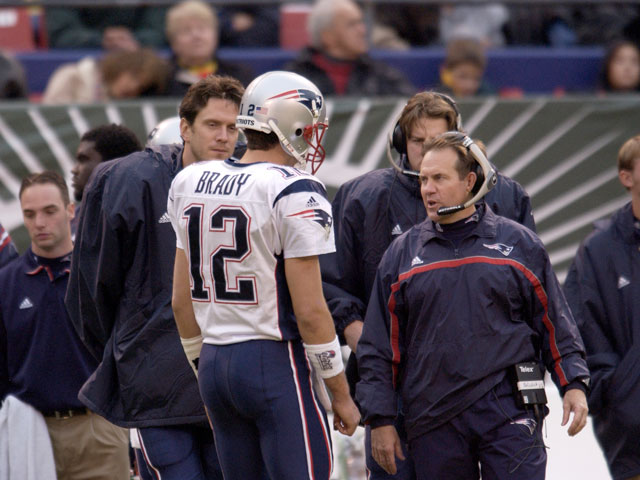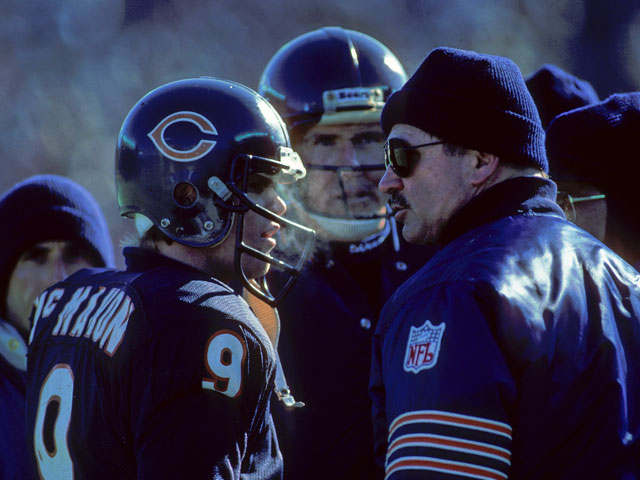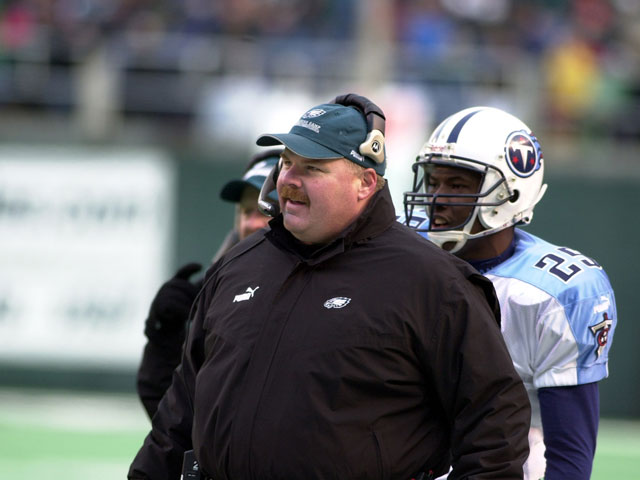How Much Do NFL Coaches Make in Salary & Endorsements?
Coach salaries in the NFL can range from $400k to $15 million. Naturally, new coaches tend to start on the lower end of the pay spectrum, but it can increase quickly if they prove their worth. Most coaches eventually cross the multi-million mark, so it’s not unusual to have seasons where every coach makes at least seven digits.
| Read: 7 min

NFL head coaches make a lot of money, but what goes into deciding their salary can vary based on factors like whether they’ve taken a team to a good spot in the playoffs or the Super Bowl. Experience, name recognition, leadership skills, and familiarity with certain players can also affect an NFL coach salary. Here are some numbers to show the breakdown.
NFL history shows it’s a famously competitive sport, with college football feeder systems and the draft serving to ensure solid balance throughout the league. Since player ability is distributed so well, a coach’s talents can make all the difference in a team’s ability to achieve success on the field.
In other words, coaches can make or break a team, so it makes perfect sense that the owners are willing to pay more to retain the best performers. Coaches still need to prove their value, but this is a job where the highest-paid NFL coaches can both ask for and receive an excellent rate.

The Highest-Paid NFL Coaches
Teams aren’t always transparent about the salaries they pay, so it’s hard to be sure which football coach is the higher earner. With that said, we do have some estimations.
In 2022, Sean McVay, coaching the Los Angeles Rams, brought the team to a victory in Super Bowl LVI. Since taking over in 2017, McVay has consistently taken the Rams to a good spot in the playoffs.
Estimates put his salary at somewhere between $15 and $18 million per year, which will keep going up if he maintains this level of performance. He’s already the youngest coach to have brought a team to the Super Bowl, so he has a realistic shot of becoming one of the best (and, thus, highest-paid) coaches in NFL history.
Bill Belichick of the New England Patriots earns about $12.5 million a year, while Pete Carroll of the Seattle Seahawks gets about $11 million.
It’s worth noting that Carroll has an outstanding career winning rate, but he’s 71 years old. That demonstrates age isn’t nearly as important as performance when deciding an NFL coach salary. After all, two of the highest-paid coaches include one of the oldest and one of the youngest head coaches.
Given that though, it’s not hard to make a good salary when you have a rock solid franchise quarterback, as is the case with a Coach like Carroll, who had Russell Wilson when he signed his most recent contract. Same goes for a coach like Kansas City Chiefs HC, Andy Reid, who just so happens to have one of the game’s most exciting young QBs in Patrick Mahomes.
And don’t think Belichick isn’t grateful for all that current Tampa Bay Buccaneers QB, Tom Brady did for his wallet (and career). Same goes for Bruce Arians when it comes to the GOAT.
The Lowest-Paid NFL Coaches
The lowest-paid coaches in the NFL are in a five-way tie. Gus Bradley (Jacksonville Jaguars), Mike Pettine (Cleveland Browns), Joe Philbin (now ex Miami Dolphins HC), Jack Del Rio (Oakland Raiders), and Jim Tomsula (San Francisco 49ers) all make $3.5 million. That sum puts them at the bottom for what a coach can currently expect to make.
Pay increases for annual salary often go up in brackets from there, at increments of a quarter-million to a whole million dollars based on performance and experience.

What Else Affects Salary?
While many factors can affect a coach’s salary, there are a few common provisions in their contracts.
First, the league can withhold salaries under specific circumstances. For example, coaches usually can’t receive their pay for the duration of a lockout, which happens as a work stoppage as a result of a labor dispute. A lockout can range from a few days to several months, meaning coaches could theoretically lose almost half their pay for a year.
Salaries may also depend on team performance. Coaches, including head coaches, can be fired with minimal warning by the owners. Typical measurements include win-loss ratios or points scored across the season, which can help to judge a coach’s efforts.
There’s no substitute for victory, so a winning season is usually enough to satisfy owners regardless of the coach’s pay. Coaches also receive bonuses for milestones like winning the Super Bowl.
Pedigree
What a new head coach gets paid largely depends on pedigree. Where did they come from? Was it a certain family tree? Was it a coaching tree? Is it their second (or third) go around on the carousel?
The most obvious example here comes from the Las Vegas Raiders, where current head coach, Josh McDaniels, came from the Belichick coaching tree, but had a stint as head coach with the Denver Broncos back in 2009-2010.
On the family side, John Harbaugh of the Baltimore Ravens and Kyle Shanahan of the San Francisco 49ers come to mind, one with a brother who has been a successful coach and the other with a father. It’s a lot easier to get a good head coach salary with the right pedigree.
Other Income Sources
Beyond their direct NFL coach salary, some individuals may have income from other lines of work. For example, they may have a deal with ESPN that gives them some money.
Coaches may also have other teaching jobs or positions within the NFL separate from their coaching. This could range from being a spokesman to helping manage internal affairs or sitting at the negotiating table. At the high end, this can be worth several million dollars each year.
How Much Do Coaches Get off the Books?
We can’t know how much coaches receive in perks, benefits, and payouts beyond their salaries. Some estimate good coaches can get more than $25 million a year total, with owners preferring to keep quiet about such figures to avoid others demanding more money.
How Do Contracts Apply?
Contracts for NFL coaches are mostly a formality. The amount of time a team signs a coach for is near-meaningless, and here’s why.
If a coach does poorly, they’ll likely get the boot before the end of their contract, even if it’s just a three-year deal. In contrast, if they’re succeeding, owners tend to offer a good extension with a nice bonus, which pushes the end of the contract out.
It’s more common for a coach to get fired early or get an extension than to end a contract. A typical coach has been with their team for a little over four seasons, but firings tend to happen almost as soon as a season ends. Owners don’t like to waste time when they decide to make changes.
In other words, owners churn through head coaches quickly to try and find someone with the potential to stay with the team for a long time. A great coach could spend their entire career with a single team. However, most will bounce between other franchises to get experience first.
Churn has not been the case for the Pittsburgh Steelers, where just three coaches have taken the mantle of leadership since 1969, including Chuck Noll, Bill Cowher, and Mike Tomlin. That kind of steady hand is good for a franchise and for the football team itself.
Does Revenue Sharing Come Into It?
Revenue sharing indirectly affects how much coaches can earn. In simple terms, the more money the NFL makes, the more coaches are likely to earn. There’s a bit more complexity in how this manifests, however.
The NFL earns money from both local and national sources.
The largest revenue source is through TV deals, which are collectively worth more than $5 billion a year. In addition, there are merchandising agreements, licensing deals, and 40% of gross ticket sales.
Local revenue sources go to a specific team. These include 60% of the gross ticket sales, payments from concessions and parking, and some corporate sponsorships. This type of revenue is significantly lower than national revenue, so there isn’t a substantial difference between most teams.
The NFL imposes both a pay floor and a pay cap. It varies year to year, based on estimated revenues, but the firm caps stop an NFL team from getting a lot of money elsewhere to hire all the best players. This approach helps ensure the NFL’s famed competitive balance.
Winning teams earn more money for the owners, which means they can spend more to retain top talent. Other teams are happy to hire proven, capable coaches instead of someone less certain. Given that, owners have an incentive to raise the pay for any coach who deserves it.
What About Assistant Coaches?
Head coaches are unquestionably the highest-paid member of a team’s staff.
Most assistant coaches, like Offensive and Defensive Coordinators, make less than $400k per season, although more talented assistants may go above this if a team wants to keep them around. Head coaches often get experience here first, so if an owner wants to promote them, they usually get a good deal in a year or two before that happens.
Not so much for the Running Back or Tight Ends coach though. They tend to get paid a fair share less.
How Does the NFL Compare to College Football?
Surprisingly, head coaches in college football can earn comparable rates to lower NFL head coaches. In some cases, they can even earn more.
The Southeastern Conference (SEC), in particular, has the highest pay for coaches, with schools in its division earning about $4.3 million.
Big 12 coaches get about $3.4 million, which is only slightly below the lowest-paid coaches in the NFL. The Big 10, ACC, and Pac-12 are up to half a million lower than that, but it’s still a solid income.
Individual coaches at specific schools can earn even more. Nick Saban is the highest earner at the college level, with a salary of about $11.7 million in 2022. Kirby Smart in Georgia isn’t far behind at $11.25 million.
Like the NFL, pay for football coaches at the college level has been steadily rising. Some argue it’s too high, with certain colleges and universities seeming less like schools and more like revenue sources for college football. Opinions on that may vary, but college coaches can earn as much as, or even more, than many NFL coaches.
It’s easy to see why a coach like Kliff Kingsbury of the Arizona Cardinals jumped from the college ranks to the pros when you consider the financial ramifications of his deal. (He's now been fired for performance)
Final Thoughts
As you can see, despite the difficulty of figuring out exact payouts, we can still estimate the average NFL coach salary with decent accuracy. Numbers can change from season to season, though, so remember that these are only estimates for getting a big-picture view and not a hard guarantee of a coach’s compensation in any particular season.
Because what the Bengals pay Zac Taylor could be drastically less than what the Green Bay Packers pay Matt LaFleur or the Dallas Cowboys pay Mike McCarthy.
Hurray for football.